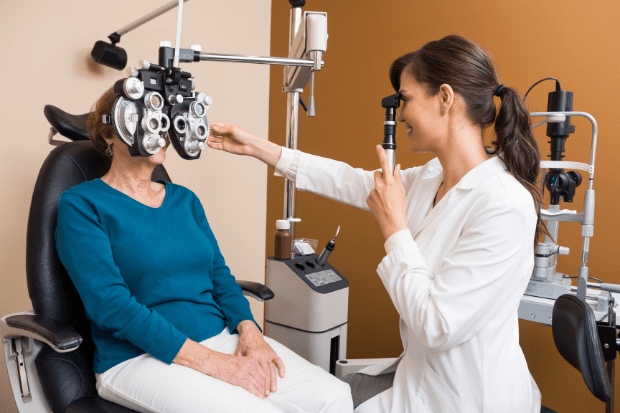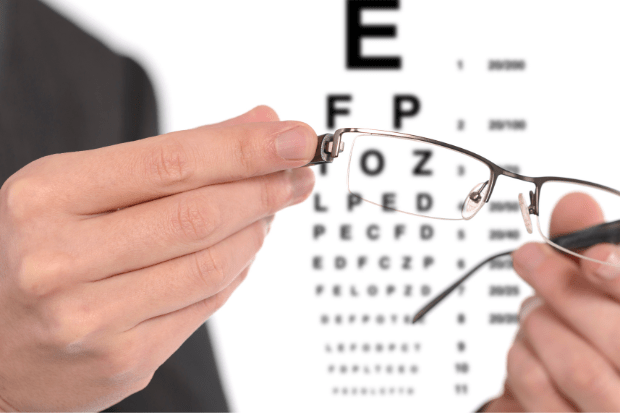How To Know If Your Glasses Prescription Is Wrong

If you are having difficulties with your new eyeglasses, it is possible that your eyeglass prescription may be incorrect, you are struggling to adapt to the complete prescription written, or you may need to give yourself more time for adaptation (at least 2 weeks is recommended). After you have checked to make sure your eyeglasses were made correctly and the prescription was ordered correctly, and given time for adaptation, you will need to check with your eye doctor to see if your glasses prescription is wrong.
Warning Signs of a Wrong Eyeglass Prescription

There are several warning signs that your eyeglass prescription is wrong. Blurred vision, dizziness, and headaches may be warning signs of an incorrect eyeglass prescription. While these can be indications, they may also be signs of something more serious or that your eyeglasses were made incorrectly. Your eye doctor may be able to retest your eyes if you are suffering from several of these signs.
Blurred Vision
Blurred vision can be a sign your eyeglass prescription is wrong, or the eyeglasses were made incorrectly. Your vision is determined by a process called refraction. The doctor gives you a series of choices and asks which improves your vision, “1 or 2”. The doctor will show you a higher number, followed by a lower number, and bracket your answers. When the choices look the same to you, that is the final eyeglass prescription. There are checks and balances in this process, but the lens selection and final eyeglass prescription are dependent on the patient’s answers to the questions.
If your eye doctor knows the prescription for your current eyeglasses, they have a better idea of the change and if you should expect some adaptation with your new prescription. Sometimes, they may ask you to put on a trial frame with the new eyeglass prescription to confirm the vision is acceptable, especially if you are a new patient or if there is a big change in the prescription from your old glasses.
Eye Strain and Headaches
Wearing the wrong lens prescription can result in eye strain and headaches. If your headaches start after wearing your glasses or become more frequent, you may have an incorrect prescription. However, even with the correct prescription, you can get eye strain and headaches for a period of time, and your eyes and brain often adapt. Adaptation to a new prescription can occur over a period of several weeks to a month.
Dizziness and Vertigo
If the prescription is too strong, the change in astigmatism is too great or there is a new amount of prism in the glasses, the patient may suffer from dizziness and vertigo. This may resolve over time and is common for new wearers of progressive lenses. Slowly easing yourself into wearing the new lenses can make these symptoms resolve.
Patients with significant astigmatism (greater than -2.50 diopters) should expect to feel some of these symptoms with a new prescription change. Changes in the astigmatism portion of the prescription may result in difficulties with depth perception, the feeling shapes are distorted or like the ground is coming up towards you, resulting in vertigo or nausea.
Those new to a no-lined bifocal often suffer from these same symptoms. Most times, the brain and eyes are able to adapt over time. Sometimes, the lens type may need to be changed. A small percentage of the population cannot adapt to a progressive addition lens (PAL) and must have separate glasses for far and near distances.
If you have been wearing your lenses for several weeks up to a month and are still experiencing these symptoms, speak with your doctor. They will be able to recommend a solution or recheck your vision.
Eye Fatigue
If you are experiencing eye fatigue with your new glasses, it can be a sign your prescription is wrong, you need a stronger prescription, your eyes need more time to adapt, or you are using your digital devices for too many hours.
Even the best prescriptions may not be adequate for hours and hours of digital device use. Frequent breaks, an anti-reflective coating, blue light filter and an updated prescription can provide your eyes with the most comfortable vision.
Lack of focus
There can be several reasons you may suffer from a lack of focus. Most commonly, the astigmatism is either too low or high or was written for the incorrect axis of the eye. If you have astigmatism, think of your eye like a clock, the astigmatism is located at a certain clock hour of the eye. The most common “clock hours” are axis 090, where the astigmatism is vertical on your cornea, or axis 180, which is located horizontally on the cornea. Some patients have oblique astigmatism, where it is diagonal on the cornea. If the astigmatism is written incorrectly, your vision will feel out of focus.
In addition, if you are over 40 and suffer from presbyopia, if you weren’t given enough power in the near portion of your glasses prescription, you may also have trouble with focus.
What to Do If Your Glasses Prescription is Wrong
If your eyeglass prescription is wrong, as confirmed by your doctor, the doctor will issue a new prescription, and most labs will re-make your glasses under a “doctor’s re-make.” Most doctors will put the new prescription into a trial frame and let you wear it to look at the letters and numbers prior to finalizing a new prescription. Once you have a new eyeglass prescription, you may resubmit it to have your lenses remade. Overnight Glasses offers its customers a one-time remake of the order.
Conclusion
A refraction is an eye doctor's subjective test to determine your prescription. If your glasses prescription is incorrect, you may experience symptoms like blurred vision, headaches, and eyestrain. Wear your glasses for several weeks to see if you can adapt, check to ensure your prescription was made correctly, and then see your eye doctor. Your eye doctor will recheck your eyes and see if any changes should be made.
